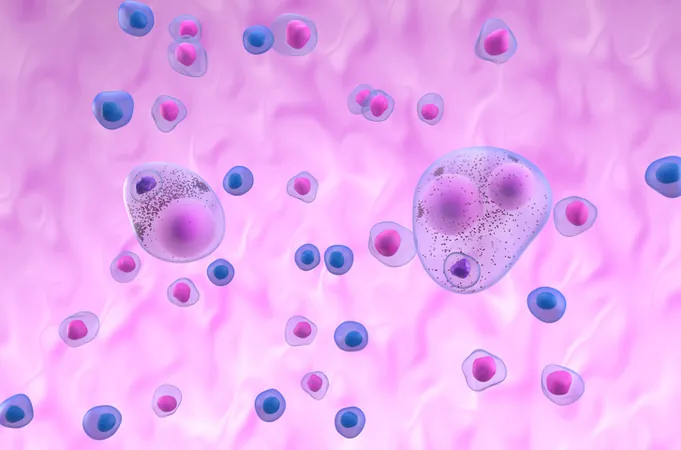
Breakthrough in Parkinson's Research: Is a Blood Test on the Horizon?
2024-11-04
Author: Siti
Groundbreaking Study Unveiled
In a groundbreaking study, researchers from Harvard University and the University of Pennsylvania have unveiled a promising new method for detecting proteins found in extracellular vesicles, potentially paving the way for a revolutionary blood test for Parkinson's disease and other neurodegenerative disorders.
Understanding Extracellular Vesicles
Extracellular vesicles, tiny lipid-coated particles secreted by most cells in the body, are crucial for facilitating communication within the nervous system. Typically smaller than 200 nanometers, these vesicles hold tremendous potential as biomarkers for conditions like Parkinson's disease, which affects millions worldwide.
Challenges in Diagnosis
One of the challenges in utilizing extracellular vesicles for diagnostic purposes has been accurately measuring the concentration of specific proteins both inside these vesicles and in the surrounding blood plasma. Lead researcher Dr. David Walt, a prominent professor at Harvard University and Brigham and Women's Hospital, believes their recent advancements bring them closer to developing a reliable blood test for Parkinson's disease. Their innovative approach focuses on quantifying the levels of alpha-synuclein, a key protein linked to neurodegenerative disorders, in extracellular vesicles versus free plasma.
The Role of Alpha-synuclein
Alpha-synuclein, primarily found in neurons of the central nervous system, has been associated with various neurodegenerative diseases, including Parkinson's and Dementia with Lewy bodies. Despite extensive study, its role remains partially understood, presenting challenges in both diagnosis and treatment.
Importance of Early Diagnosis
Diagnosing neurodegenerative diseases like Parkinson's and Alzheimer's in their early stages is notoriously difficult. Early intervention is critical, as treatment options are more effective when initiated early in the disease progression. An accurate blood test could be a game-changer, facilitating timely diagnosis and improved patient outcomes.
Innovative Methodology
As detailed in the scientific journal PNAS, Dr. Walt and his team utilized a cutting-edge combination of techniques to measure proteins within the extracellular vesicles. Their methodology included high-yield size-exclusion chromatography, a protease protection assay, and a Single Molecule Array (Simoa) digital enzyme-linked immunoassay (ELISA). This allowed them to determine that alpha-synuclein is largely present in free plasma rather than encapsulated within the vesicles. Remarkably, they developed a targeted test for phosphorylated alpha-synuclein at the Ser129 residue, a critical indicator of Lewy body formation in Parkinson's disease and related disorders.
Expert Insight
Dr. Walt stated, "The ongoing study of extracellular vesicles has enhanced our understanding of their complex biology. However, the isolation of pure, tissue-specific extracellular vesicles from blood and cerebrospinal fluid remains a significant challenge. Our latest findings offer a promising solution to this technological hurdle and may unlock the door to utilizing these vesicles as clinical biomarkers."
Hope for the Future
With the potential for early detection and more effective treatment options, this research not only shines a light on the future of Parkinson's diagnosis but also ignites hope for millions impacted by neurodegenerative diseases. Stay tuned as scientists continue to explore the possibilities within extracellular vesicles and work towards a breakthrough that could transform the landscape of Parkinson's disease testing and treatment!





 Brasil (PT)
Brasil (PT)
 Canada (EN)
Canada (EN)
 Chile (ES)
Chile (ES)
 España (ES)
España (ES)
 France (FR)
France (FR)
 Hong Kong (EN)
Hong Kong (EN)
 Italia (IT)
Italia (IT)
 日本 (JA)
日本 (JA)
 Magyarország (HU)
Magyarország (HU)
 Norge (NO)
Norge (NO)
 Polska (PL)
Polska (PL)
 Schweiz (DE)
Schweiz (DE)
 Singapore (EN)
Singapore (EN)
 Sverige (SV)
Sverige (SV)
 Suomi (FI)
Suomi (FI)
 Türkiye (TR)
Türkiye (TR)